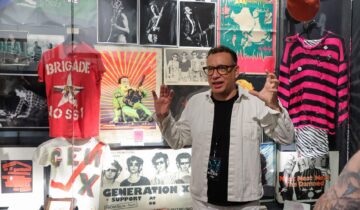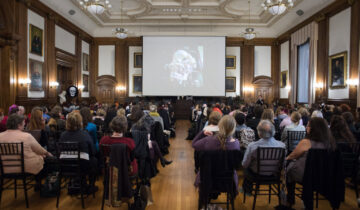
D 32808-05 Amy Winehouse Obligatory Credit – CAMERA PRESS/Mark Okoh SPECIAL PRICE APPLIES. Jazz and soul singer Amy Winehouse poses for photos at her home in Camden, London. Her debut album ‘Frank’ won an Ivor Novello award and was released in October 2003. 2004
The clip is captivating because of its perceived simplicity: Winehouse is focused, and she’s telling her own personal story about love gone awry. She bends notes just enough to make them sound dirty without showboating. She allows her voice to get raspy and quiet, and allows for pauses, unafraid of the silence. She makes it look easy, which it is not. If you don’t know much about Winehouse, the video is a great place to start.
The video loop is part of an exhibit that opened at the museum last week, “Amy Winehouse: A Family Portrait,” organized by the Jewish Museum London in collaboration with the Winehouse family to commemorate their daughter. Winehouse, who won five Grammys – the first British female artist to do so – in 2006 for her “Back to Black” album, died in the summer of 2011 due to alcohol poisoning.
Alex Winehouse, Amy’s brother, wrote much of the text featured in the placards throughout the exhibit, which is at times cute (she collected retro refrigerator magnets and loved puzzles), and fashionable (her distinct choices of small dresses, shoes, and headscarves): it’s like taking a stroll through Amy’s bedroom. But it doesn’t offer much insight into how she developed her sound, how she wrote songs, and how she developed as a musician and songwriter.
In a small nook attached to the exhibit is “You Know I’m No Good,” a small collection of work from three contemporary artists aimed at exploring Winehouse’s relationship with the limelight, which was tumultuous. Her bouts with alcohol, drugs, and bulimia became tabloid fodder. Jennie Ottinger’s contribution, which essentially accuses Winehouse of racial and cultural mimicry, is provocative but unexpected, considering how earnest the main exhibit is.
In her piece, the illustrated mouths of iconic African American female singers are cut out and re-positioned on illustrations of Winehouse. “I wanted to explore the notion of cultural appropriation,” Ottinger said at an early viewing of the exhibit last week. “You just want to like what you hear without any guilt, but there’s a whole tradition behind her work that’s not often mentioned.”
It’s a worthwhile discussion but one with no concise conclusion: Winehouse was a middle-class Jewish girl from North London whose singing style and taste in music was derivative of singers like Nina Simone, Ella Fitzgerald, the Supremes, the Ronettes, and other Black singers. Winehouse’s favorite albums from artists like Earth, Wind & Fire, Tony Bennett, Thelonius Monk, and Mary J. Blige are featured in the exhibit. In 2007, she explained, “I listen to a lot of ’60s music but society is different now. I am a young woman and I am going to write about what I know.” Lyrics to her songs like “You know I’m No Good,” “Love is a Losing Game,” “Rehab,” and “Stronger Than Me” leave a trail of bravado lined with melancholy that were rooted in the singer’s much-publicized, real-life relationships and tendency toward substance abuse.
Bay Area bands Midtown Social (California soul), LoCura (Flamenco), and Karina Denike (Motown, torch songs) will perform their own renditions of Amy Winehouse songs at the museum on Aug. 13 and 16. Expect celebratory events aimed at providing a positive retrospective of Winehouse’s life and music devoid of tabloid gossip.
Amy, a new documentary film about Winehouse by British filmmaker Asif Kapadia is not concerned with positive messaging about the singer, but instead spends two hours showing the trajectory of her career, flaws included. The film should be required viewing alongside the Contemporary Jewish Museum exhibit.
Footage of early gigs – even late-’90s shows at her theatre school – show a young woman with an extra supply of natural talent who was not afraid of the stage. Later-career gigs fueled by exhaustion and various substances are not so pretty: unable to sing at an outdoor festival in Belgrade, the band is dumbfounded and she is booed off the stage. In clips of “Back to Black” recording sessions with producer Mark Ronson, she is determined and spot-on. During a studio recording date with Tony Bennett, she nearly gives up, saying she’s no good and can’t do it. Bennett is patient, and comforts her. After a break she comes back and delivers the goods.
“Amy Winehouse: A Family Portrait,” is on display now through November 1.
“Amy” is currently screening at select local theaters.
Photo by Mark Okoh, courtesy of the Contemporary Jewish Museum of San Francisco



